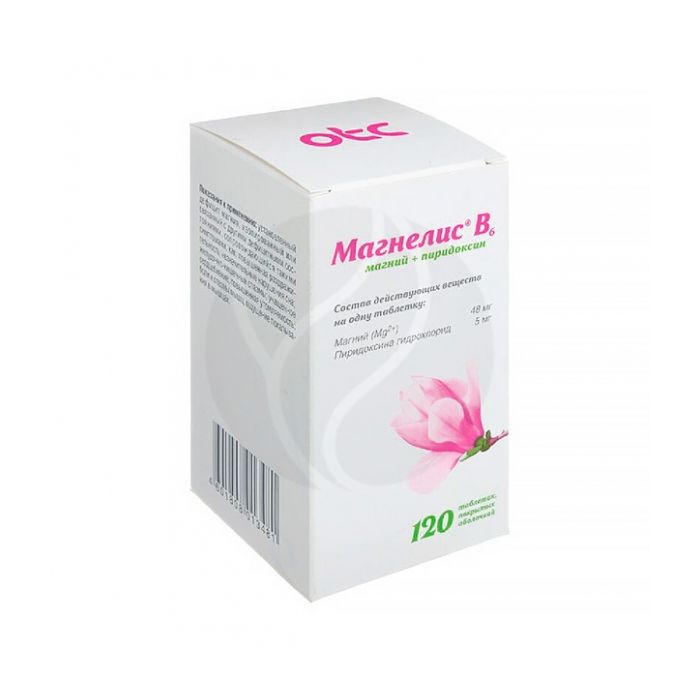Magnelis B6 tablets p / o, No. 120
Expiration Date: 11/2025
Russian Pharmacy name:
Магнелис В6 таблетки п/о, №120
Adults are recommended to appoint 6-8 tablets / day.
Children over 6 years old (weighing more than 20 kg) - 4-6 tablets / day.
The daily dose should be divided into 2-3 doses.
Treatment should be discontinued after normalization of blood magnesium concentration.
The drug should be taken with meals with a glass of water.
magnesium lactate
pyridoxine hydrochloride
Excipients : sucrose, povidone (Kollidone 30), Kollidone SR (polyvinyl acetate, povidone, sodium lauryl sulfate, silicon dioxide), magnesium stearate, sodium carmellose (sodium carboxymethylcellulose), talc.
Shell composition: sucrose, kaolin (white clay), gelatin, acacia gum (gum arabic), white beeswax, carnauba wax, talc, titanium dioxide.
severe renal failure (CC less than 30 ml / min);
phenylketonuria;
children under 6 years of age;
hypersensitivity to the components of the drug.
The drug should be used with caution in patients with moderate renal impairment. there is a risk of developing hypermagnesemia.
pharmachologic effect
A drug that replenishes magnesium deficiency.
Magnesium is a vital element that is found in all tissues of the body and is essential for the normal functioning of cells. It participates in most metabolic reactions, in the regulation of the transmission of nerve impulses and in muscle contraction, has an antispasmodic, antiarrhythmic and antiplatelet effect.
The body gets magnesium from food. Lack of magnesium in the body can be observed in violation of the diet (diet) or with an increase in the need for magnesium (with increased physical and mental stress, stress, pregnancy, use of diuretics).
Pyridoxine (vitamin B6) is involved in many metabolic processes, in the regulation of the metabolism of the nervous system. Improves the absorption of magnesium from the gastrointestinal tract and its penetration into cells.
Serum magnesium content of 12 to 17 mg / l (0.5-0.7 mmol / l) indicates moderate magnesium deficiency; below 12 mg / l (0.5 mmol / l) - about severe magnesium deficiency.
Pharmacokinetics
Suction
After taking the drug inside, the absorption of magnesium from the gastrointestinal tract is 50%.
Withdrawal
It is excreted mainly by the kidneys. In the kidneys, after glomerular filtration, 70% of the magnesium present in the plasma is present, its reabsorption in the renal tubules is 95-97%.
Indications for MagnelisЃ B6
established magnesium deficiency, isolated or associated with other deficiency conditions.
Dosage regimen
Adults are recommended to appoint 6-8 tablets / day. Children over 6 years old (weighing more than 20 kg) - 4-6 tablets / day. The daily dose should be divided into 2-3 doses.
Treatment should be discontinued after normalization of blood magnesium concentration.
The drug should be taken with meals with a glass of water.
Side effect
From the digestive system: abdominal pain, constipation, nausea, vomiting, flatulence.
Allergic reactions: Allergic reactions are possible.
Contraindications for use
severe renal failure (CC less than 30 ml / min);
phenylketonuria;
children under 6 years of age;
hypersensitivity to the components of the drug.
The drug should be used with caution in patients with moderate renal impairment. there is a risk of developing hypermagnesemia.
Application during pregnancy and lactation
Clinical experience has not revealed a fetotoxic or teratogenic effect of the drug.
MagnelisЃ B6 can be used during pregnancy only as directed by a doctor.
Magnesium penetrates excreted in breast milk. Avoid using the drug during lactation and breastfeeding.
Application for impaired renal function
The drug should be used with caution in patients with moderate renal impairment. there is a risk of developing hypermagnesemia.
Use is contraindicated in severe renal failure (CC less than 30 ml / min).
Application in children
Contraindication: children under 6 years of age.
special instructions
If it is necessary to use the drug in patients with diabetes mellitus, it should be borne in mind that the tablets contain sucrose as an excipient.
In case of concomitant calcium deficiency, the magnesium deficiency should be corrected before taking calcium supplements.
Overdose
With normal kidney function, ingestion of magnesium does not cause toxic reactions. Magnesium poisoning can develop with kidney failure. The toxic effects are mainly dependent on the serum magnesium content.
Symptoms: falling blood pressure, nausea, vomiting, slow reflexes, anuria, respiratory depression, coma, cardiac arrest.
Treatment: rehydration, forced diuresis. Renal failure requires hemodialysis or peritoneal dialysis.
Drug interactions
With the simultaneous use of drugs containing phosphates or calcium salts, a significant decrease in the absorption of magnesium from the gastrointestinal tract is possible.
Magnesium preparations reduce the absorption of tetracycline, it is recommended to separate the intake of these drugs at 3-hour intervals.
Magnesium reduces the effect of oral thrombolytic agents, reduces the absorption of iron.
Vitamin B6 inhibits the activity of levodopa.

